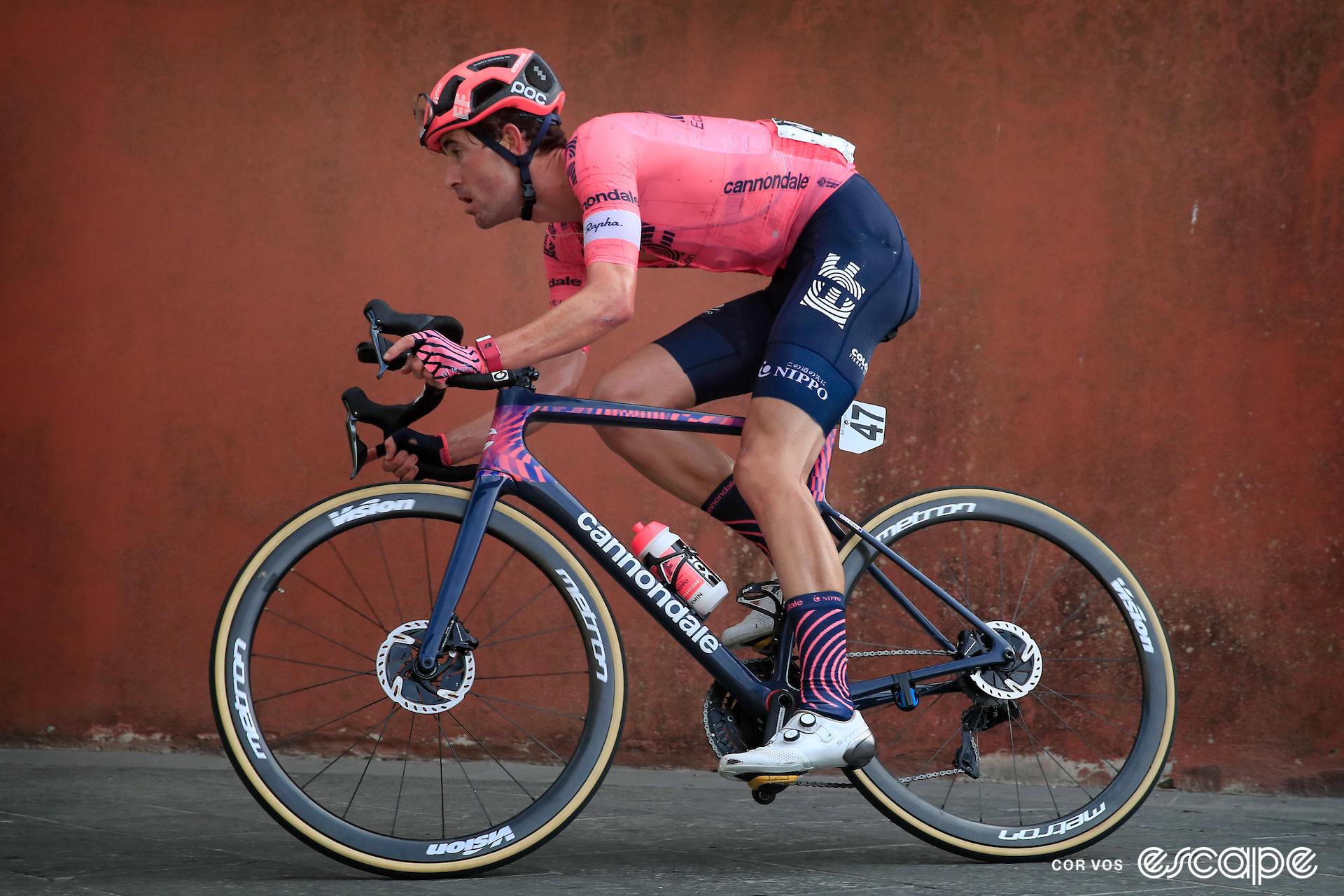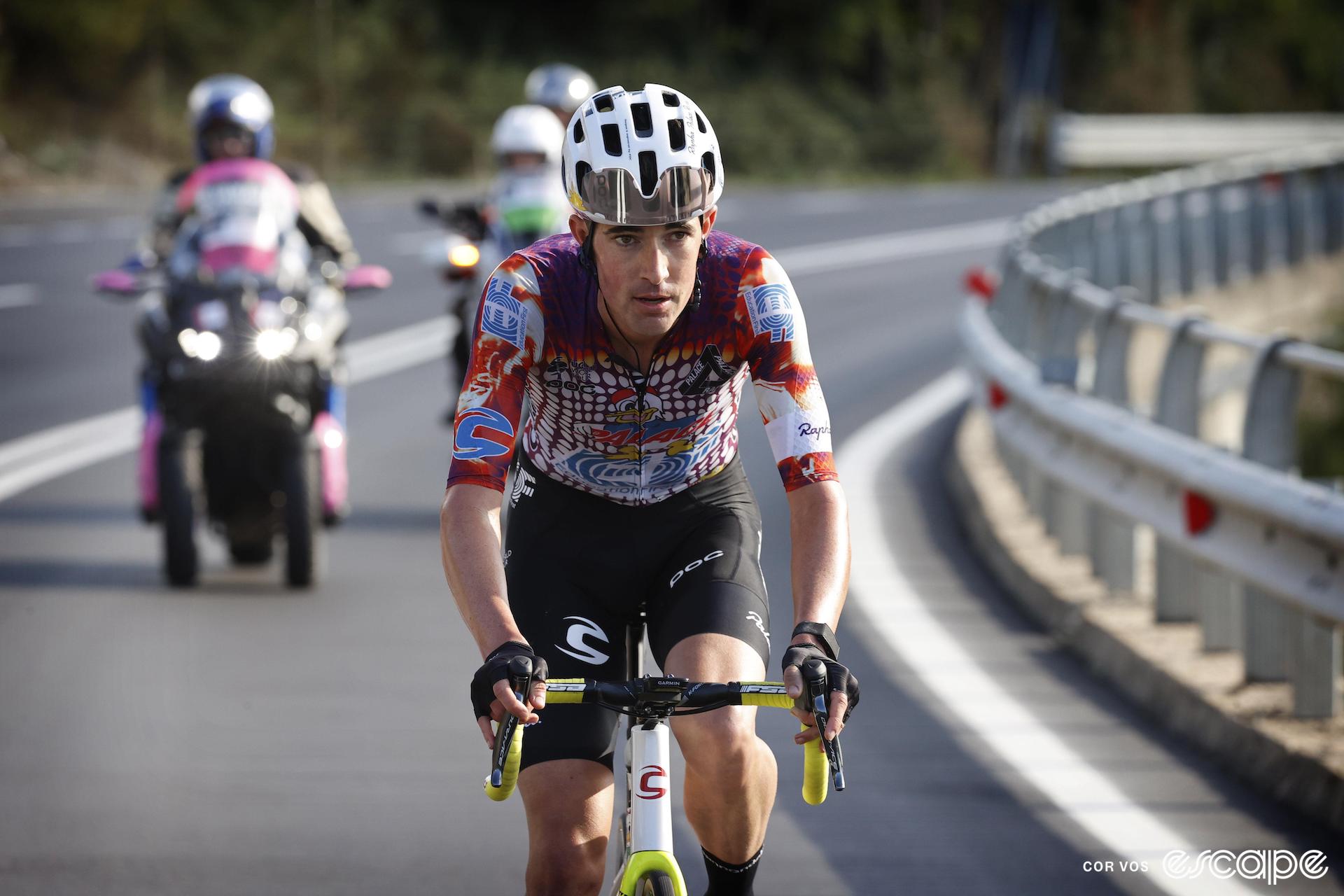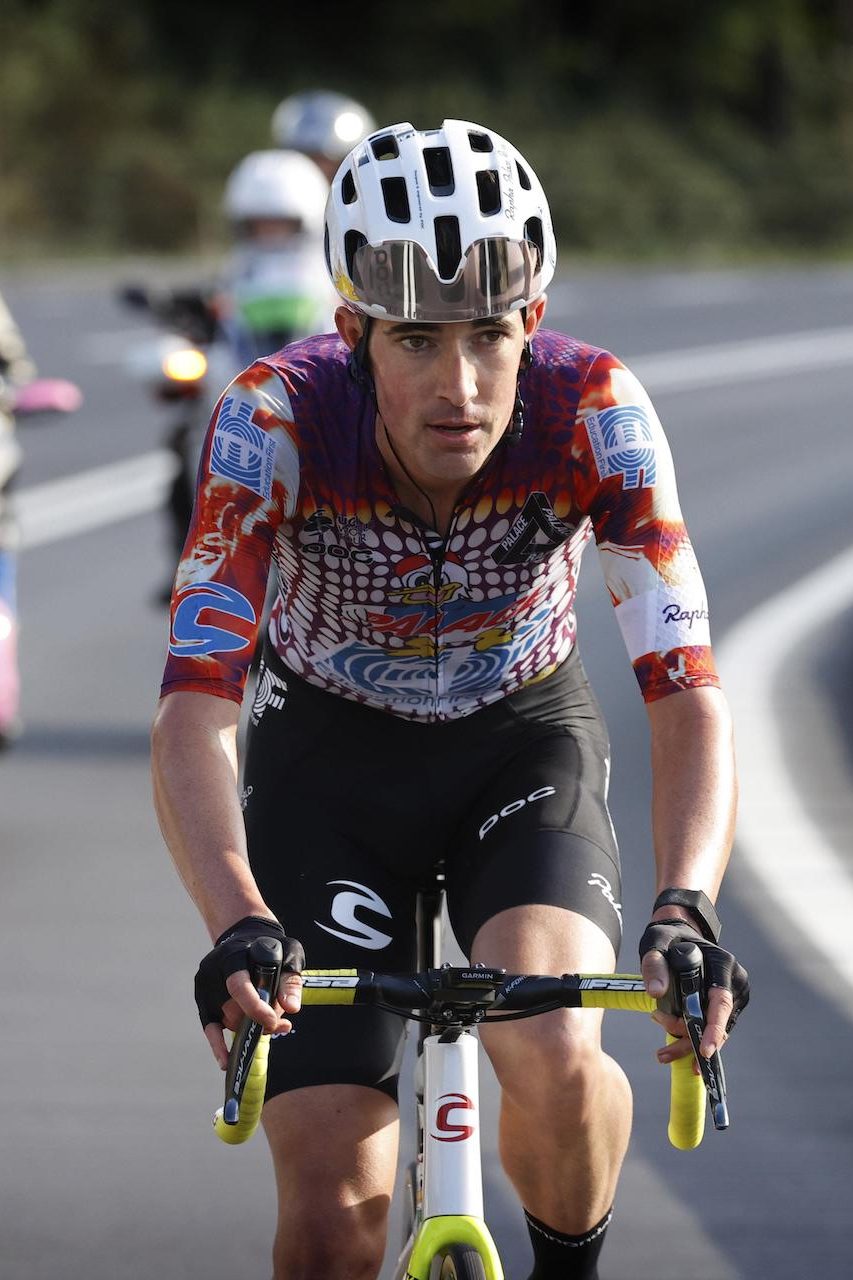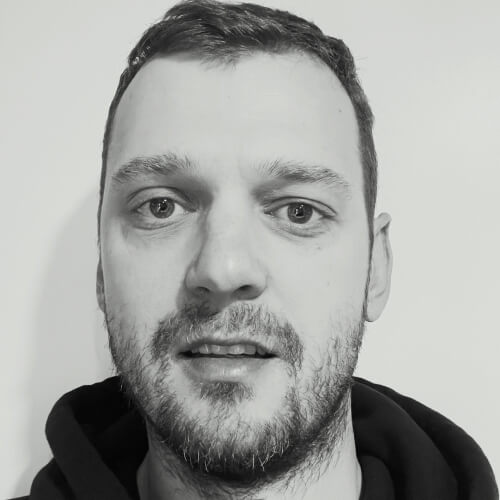When most riders drop out of the pro ranks, they don’t tend to return. Maybe they drop down to the Continental level for a few years, or maybe they leave the sport entirely. But Australia’s Jimmy Whelan isn’t most riders.
After an injury-plagued 2021 season, Whelan’s three-year contract with EF Education-Nippo wasn’t renewed, leaving the former runner without a gig for the following season. But he was determined to fight back. He was second at the Aussie Road Nationals in early 2022 and then won the Santos Festival of Cycling (a scaled-down version of the Tour Down Under run during the COVID years), but still a pro ride didn’t materialise. He headed back to Europe and rode the 2022 season with Australian Continental outfit Team BridgeLane but never gave up hope of returning to the big leagues.
He looked to have a pro contract sorted for 2023, but that fell through. Again, he decided to stay in Europe, burning through his savings while he kept training and pushing for a contract. In May he joined Portuguese Continental team Glassdrive Q8 Anicolor and in late August, in his biggest race for the team, won the queen stage of the infamously difficult Volta a Portugal.
Just last week, Q36.5 Pro Cycling Team announced it had signed Whelan for the 2024 season. The 27-year-old’s persistence and self-belief had paid off, and he’ll return to the pro ranks next season, albeit in a second-tier team. Earlier this week, Whelan spoke to Escape Collective during the lunch break of a training ride near Girona. He spoke about the self-belief needed to get to where he is now and what he’s expecting from the year ahead.
***
Matt de Neef: Congrats on the gig! How are you feeling now that this contract is all sorted and you’ve got a path forward?
Jimmy Whelan: It’s still pretty surreal. I know a lot of people say that. But now that I’ve started getting emails from logistics people and starting to get emails about bikes … I can’t believe it to be honest.
It’s been the last two years chasing this. For it to actually pull off doesn’t happen often. I mean, if you look at the stats, when you get pushed out of the WorldTour, particularly being a non-European in a European sport, it’s really difficult to keep going, for a lot of reasons. I believed in it throughout this whole process, but to get the call from Doug [Ryder, general manager at Q36.5] the other day, saying that I was gonna get the gig was pretty incredible.
I got the last climbing spot and it was between myself and quite a few other WorldTour riders and he chose me. So I consider myself quite fortunate that Doug could find a solution to my situation and believe in me, which is nice.
You had to believe in yourself for such a long time and you didn’t give up where a lot of other people would have. Are you proud of yourself for sticking it out like that? And what was it that kept you going, and kept you over in Europe, fighting for it?
I think in a lot of situations, a lot of guys just don’t stop because it’s their identity, and they don’t know what else to do. Which is totally fair enough. That wasn’t my situation. In my case, I was lucky enough to have enough savings just to almost go by two years in Continental level. I would say I had to believe in myself almost in a stupid way. Because again, if you look at the stats, everything would suggested that I would get to the end of this year and have to go back to Australia basically.
The way I raced at the end of my EF contract was a really important thing for me; the way I raced at the Italian classics. I showed that I had the technical skill and the physical capabilities to actually have a full career in this sport at the WorldTour. And just by having that little snippet in September and early October at the end of 2021 to see how I was racing then really showed that it’s definitely worth at least going for another year.
And then when I was on Bridgelane I came second in the Nationals and then won the TDU [see image below], and then again showed that maybe I’d actually go pro that year. Everything suggested that it was worth kicking around for two years or at least a year and a half trying to go back pro again. And in the end it was worth it. It’s crazy to be able to say that.
It’s pretty cool the last week or two since the news came out just how many people have reached out. I guess when you look at it, there’s not many stories like this one. Normally in my situation a guy would go race in Asia, for example, where you can still get paid a decent amount to be able to support yourself. But I’m so glad I stuck it out in the end.
I’m pretty lucky to also just have the belief from a lot of other people. It’s one thing to think that you can do it yourself but then to have other people saying to keep going, it’s also nice. I’m also lucky that I came into the sport late. Just the whole ‘being a bike rider in Europe’ thing is actually still very pleasing. Even if I’m WorldTour or not.
I was looking back through our messages from late last year and you were saying that it looked like you had a pro contract sorted out this year. You mentioned Bora-Hansgrohe and then Black Spoke. And then it seemed like all of that fell through. What happened?
When we last spoke they were finalising the last climber spot at Bora and I was on the shortlist and it took them a while to make a final decision. Bora had an agreement with Black Spoke that if Bora didn’t pick me then I’d get on to Black Spoke. But in the end that didn’t actually happen, which was really disappointing and really incredibly poor form from management at Black Spoke. It wasn’t their intention, they didn’t want to do it, but I just think they were so disorganised that it just ended up happening. Two guys they ended up signing to fill the last spots didn’t even race all year anyway. And the situation with Black Spoke now – it’s pretty disappointing to see so many guys out of a job.
But yeah, that was the main reason why I said I thought I was in a good situation. I was waiting on Bora and then had the insurance with Black Spoke. But then in the end it all closed in my face, which was disappointing, but then it was fuel for the fire to keep going. And that’s where having the Australian Nationals is kind of lucky. A rider like myself can have something tangible to chase in October, November, for January. It can also be a bit of a curse for guys too because it means that they keep going for longer than they should …
So how did the deal with Glassdrive end up happening?
When I went back to Australia, it was pretty clear that I wasn’t going to be pro this year. And I thought, ‘Well, if I can win Australian Nationals, that’ll change a few things.’ Because everyone watches the Australian nationals, all Europeans, and I can at least show that I’m one of the strongest bike riders there by racing quite stupid in a way, being aggressive [Whelan was in the early break and super-aggressive throughout. Eventual winner Luke Plapp described Whelan as ‘the strongest rider in the race’ – ed.]
After my ride at Nationals I moved from one of the biggest agents in cycling across to Baden Cooke, who only has five guys. So that was a pretty important change for me, just going from an agency where there’s, you know, 50 guys on the books, to Cookie who only has four or five guys and does it kind of as a side thing in a way and is really passionate. When we spoke he was really keen to find a solution for me.
I honestly think if I was still with my old agent, I don’t think I’d have this opportunity [with Q36.5 – ed.] Cookie did a really good job. He has a lot of connections that a lot of guys don’t, personal connections too. And he has an incredible ability to bring out emotions in people, and luckily with Doug Ryder he has a history of signing guys that obviously are capable of getting a job, but also that have kind of a good story. I’d also had previous talks with Doug at the end of 2021, and also last year, too, so it wasn’t out of nothing.
But back to your question, I came across to Europe, and was just hoping that a spot would open up on a team and I’d be race ready, which I was – I was training up in Andorra, at altitude, on the ergo, and outside when the weather was OK. And that was probably the best form I’ve ever seen myself in, after Australian nationals and going across to Europe.
And then I was doing some of the Spanish races – basically like Spanish NRS [National Road Series] – as an individual. And I was doing pretty well there. Rúben Pereira, who’s the director of Glassdrive, he just added me on Instagram; didn’t even say anything. And then I followed him back and sent a message saying ‘You looking for a rider this year?’, in Portuguese.
He looked into it. And yeah, it wasn’t a paid gig. He said the rider budget was already maxed, but there was everything – bikes, really good equipment; everything for a platform to go pro again. A good calendar with the main goal being Volta a Portugal. And so I was sitting there and I thought, ‘Well, it’s better than doing a European cycling training holiday for the rest of the year.’ And I said to myself ‘I wouldn’t mind racing against other pros in order to keep waving my flag anyway.’
The video of you winning the Tour of Portugal stage in August was pretty amazing. It looked like it really meant a lot to you to get that win?
Yeah, I came into the race knowing that if I won a stage of the Volta a Portugal, it could solve a lot of problems. I didn’t know if it would, but I knew that at least then I had a bit of leverage.
Earlier on in the race, I actually was having a strange leg problem from the new bike and the bike fit and it basically meant that I had to pull out of two major climbing moves that I did throughout the race, which actually put me out of the GC in the end. And so I actually thought that my race was more or less finished. I could still get around. It wasn’t that type of injury, it was just when I went really hard. But then on the rest day, I saw an osteopath and managed to kind of solve a bit of my leg problem. There were three climbing days and I was able to win the queen stage and all the emotions came out on that day.
At the bottom of the climb I had my teammate who was riding for me. When he did his massive pull to the bottom of the climb and yelled at me at the bottom it gave me goosebumps and I just went all in, attacked with about 6 km to go from a group of 20 guys and yeah, that was that.
There was a media guy for the Volta a Portugal – he got that footage that was really quite special. He captured it really well. I can’t say I’ve ever yelled on a bike before – I don’t know why I did that. I didn’t yell because it was like ‘Oh, now I can try and contact teams again and try and go pro again’ it was just to show, very publicly, that I’ve still got it, and also to myself too.
It’s been a lot of time this year, up and altitude, out by myself, with no one really believing in me other than Mum and Dad, and everyone back home, which is amazing. But at the end of the day, it takes a lot. And it was getting to a point where I was thinking ‘Am I being so stubborn here that I just need to grow up a bit and move on?’ But the numbers and stuff that I was doing this year, everything was suggesting that if an opportunity comes up then it’s worth checking it out. And in the end, it is now.
I’m going into a training camp in December. And yeah, I can’t believe it. Just to see a paycheck again in January will be pretty special.
In the end, did that stage win in Portugal help you get the contract? Or was that already in motion before then?
People saw at the end of my EF contract in Italy how I was racing, and they thought ‘OK, this guy can actually ride a bike.’ And then also second in the Nationals and also winning the TDU that next year. So I had a lot of management from various teams from WorldTour and ProTour who were well aware of my situation and who I was. So I knew that if I could just get that one more result in Europe …
And doing it at the Volta Portugal – the standard’s really high there. I knew that it would get conversations going again, and maybe an opportunity on a team would come up. And it did in the end. I had a lot of teams that were saying ‘Yeah, we’ll keep a close eye on you this year and see how you go on Glassdrive and we’ll speak to you later on.’ Basically ‘Get a result and we’ll put you on our shortlist and we’ll see what happens.’
So did that stage win make the difference for Doug Ryder? Is that when you got the call?
I definitely ticked the box in terms of ‘OK, he’s got the result now – he’s clearly showing that he’s got the stage race form to be a GC rider etc.’ So I was just ticking boxes – I didn’t tick the box for getting the contract. I was only just put on the shortlist of maybe 10 riders. So I still wasn’t really that close.
There were other teams as well. These days, teams are spoilt for choice with, unfortunately, teams folding and then also there’s so many good juniors coming through. It’s so competitive. And that’s the way it should be – it’s a pretty big sport with the top of the sport not being very big. Luckily, in my situation, there’s always a shortage of climbers compared to all-rounders or sprinters. It was important to show that climbing performance, which kind of put me in that type of profile.

So you’ve got a one-year contract with Q36.5, right?
Yeah, just the one year. I didn’t have much negotiating power. I just told Doug ‘Whatever you give me, I’ll take’. I’ll just get into the season in good form and hopefully come March we’ll already be signing new paperwork. So that’s the goal for now.
It’s only a one-year so I’ve gotta make sure that I’m really doing all the right stuff now to make sure I come into the season nicely. It’s super exciting to be doing a preseason where I’m preparing for races that are going to be some of the biggest stage races of the year.
Do you have a sense of what your calendar will look like to start the year? Will you come back for Nationals and the other Aussie races?
It’ll depend on a few things. So obviously, Q36.5 doesn’t do the TDU but I’d love to ride for the Aussie team at TDU. So that’s still being worked out behind the scenes. So if I got the TDU start in the Oz team, then I’ll get the green light to go all in for January. Otherwise, I’ll have to keep a little lid on it and go to the camp in December and January.
I’ll at least have five weeks back in Melbourne and then head over to Europe and do the preseason there. Maybe I get a green light for TDU and I come back for Nationals and Cadel Evans Road Race, which would be a dream scenario for me because I just want to kick off the season well. And I love Nationals and it’s the last one in Buninyong.
Has Doug given you an idea of what races he can see you doing next year?
They’re not 100% on their race starts just yet. But for example, a really important race for them is the Tour de Suisse and the climbing trio that they want to send to all the races will be myself, Mark Donovan, and Damien Howson. But we’ll see.
This year, they got a lot more race starts than they thought they would and they got invited to some pretty big stuff. For example, they didn’t realise they were going to Tour of Flanders until about a week before. I told Doug I’m a climber but I have to remind him that I won on cobbles as my first European win [Whelan won the 2018 U23 Tour of Flanders in what was literally his first bike race in Europe – ed.] I told him I assumed I’d make the selection for that. “64 kg man does Flanders in cold weather and gets hypothermia.” [laughs]

Now that you’re back in the pro ranks, is there something you want to do differently compared to last time?
I mean, from a technical perspective, I just know how to race a bike and I understand bike racing a lot better than before. Probably one of the biggest things is nutrition and how to fuel on a bike. So purely from that perspective that’s one thing I’m going to be changing a lot compared to when I was on EF.
But I wouldn’t change a whole lot. I mean, the way I was racing at the end of my contract and also the second year of my contract was pretty good. I’d certainly put a big emphasis on climbing and the preparation that I do in Andorra is a really important part of that – the altitude and the amount of elevation that I can do.
At EF they wanted me as an all-rounder but Q36.5 it’s pretty obvious that they want me as a climber so that requires different training. And also just different pressure and expectation on results. This contract is a ‘you need to perform’ not ‘you need to experience how to race’ so it’s a completely different ballpark for me now.
What did you think of this story?


